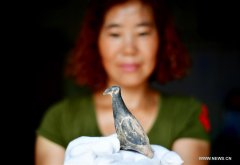China Focus: Village prays for return of missing ancient Buddha
FUZHOU, July 14 (Xinhua) -- Dozens of villagers burnt incense in Pu Zhao Tang, the village temple in Yangchun, eastern China's Fujian Province, Thursday evening while praying for the return of the missing ancient Buddha statue that was once worshiped in the temple.
The statue is unusual because it contains the mummified skeleton of a Song Dynasty (960-1279) Buddhist monk.
The prayer rite was observed on the eve a transnational lawsuit filed by the Chinese villagers to a Dutch court in pursuit of the stolen Buddha, which is currently held by a Dutch collector.
Villagers exchanged information on the case in the temple. On Friday, the first hearing was held in a court in Amsterdam.
Lin Wenqing, a villager, told Xinhua that the village committee hired a team of Chinese and Dutch lawyers to attend the hearing.
After they heard from media reports that the statue was displayed at a "Mummy World" exhibition at the Hungarian Natural History Museum in 2015, the village went through official and private channels to negotiate with the Dutch collector for the return of the statue.
"The Dutch collector had given three conditions on a presumed return of the statue, which astonished our villagers and were refused," Lin said.
Lin said the collector Oscar van Overeem wanted to give the Buddha to a renowned Chinese Buddhist temple rather than "an unknown village temple," and that he also wanted money and other things from China in exchange for the Buddha.
The Dutch collector claimed he collected the 11th-century relic in 1996, one year after the statue was stolen from the temple. Local people still display the statue's hat and clothes in the temple.
Media reports revealed that X-rays had shown an intact skeleton was inside the Buddha statue.
Lin said the Buddha had been worshiped inside the village temple for over 1,000 years. Although the statue was stolen, villagers still hold a praying ritual every year on the Buddha's birthday on Oct. 5 in the lunar calendar.
The statue is of Zhanggong Zushi, a local man who became a monk in his 20s and won fame for helping people treat disease and spreading Buddhist beliefs.
When he died at the age of 37, his body was mummified as he had wished and placed inside the statue during China's Song Dynasty. The statue has been worshipped in the village temple ever since.
Hundreds of residents in Fujian wrote a letter to Dutch Prime Minister Mark Rutte in March 2015, pleading for return of the statue. The letter was handed to European-Chinese groups in the Netherlands, which delivered it via the Chinese embassy.
"We believe this is the Buddha we have been searching for over the past 20 years and we look forward to its return," the letter said in both Chinese and English.
The Dutch court registered the village's lawsuit in June 2016.
The villagers have volunteered to set up a relic protection association to deal with the claim.















